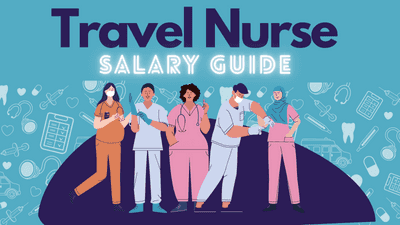How To Become A Travel Nurse In 6 Steps|2024
Written by Chaunie Brusie with expert review by Kathleen Gaines
What Is a Travel Nurse?
Your immediate vision of travel nursing may be exploring exotic destinations, but that’s not necessarily true. Being a travel nurse means you are employed by an independent nursing staffing agency instead of a single hospital.
This means you could travel as far as a different country, or you could work at a hospital near your home in need of temporary nurses. The choice of when and where to work is up to you, but travel nursing doesn’t always have to mean far away travel.
Looking for open travel nurse assignments? Speak with a recruiter today!
Travel Nurse Requirements
All travel nurses must meet certain requirements before applying for contracts. These include licensure, a degree, certifications, and some experience. Let’s look at each one.
1. Nursing License Requirements
Travel nurses are required to have an RN license in the state they are contracted. Now, if your permanent residence is one of the states that are currently part of the Enhanced Nursing Licensure Compact (eNLC), then consider yourself lucky. You will not need an individual state license if you are contracted to work in another eNLC state.
However, if your home base is not an eNLC state – you will be required to apply for an individual state license. This must be granted prior to the start of your contract, so plan ahead and start drafting your ideal location list early to make sure you’re ready when a recruiter finds a contract for you.
2. Nursing Degree Requirements
Most travel nurses are expected to have a BSN. The minimum requirement for travel nursing is an Associate Degree in Nursing (ADN). However, depending on the hospital or facility, a BSN may be preferred. For this reason, some travel nurse agencies will only work with nurses who have completed a BSN degree.
More specifically, most large healthcare systems will require a BSN, especially those with Magnet designation.
Magnet is awarded by the American Nurses Credentialing Center (ANCC), a subsidiary of the American Nurses Association (ANA), and is awarded to individual hospitals that have been recognized for achieving the “gold standard” of nursing care. According to the ANCC and ANA, nurses that have earned a BSN have a higher level of skill and abilities.
Find available, high-paying travel nurse opportunities.
3. Nursing Certification Requirements
Certifications will depend on the unit and the specific job requirements. All nurses (staff nurses and travel nurses) are required to have a Basic Life Support (BLS) certification, and most will have either a Pediatric Advanced Life Support (PALS) or Advanced Cardiovascular Life Support (ACLS).
Travel nurses are expected to have and maintain these certifications prior to signing on with a travel nurse company. Additionally, some travel nurse agencies will assist their nurses with certification and recertification.
It’s important to speak with the nursing agency recruiter to determine eligibility. If the travel agency does not assist with recertification, some hospitals will allow travel nurses to attend in-hospital classes. The other viable option is through a certification agency.
All other job-specific certifications should be discussed in the contract prior to signing. Earning additional certifications will increase both your job opportunities and earnings potential.
Specific specialty certifications such as CCRN or CWON are not required for most travel nursing positions. However, those certifications will move your application to the top of the pile — especially in the highly competitive travel nursing industry.
These are the three most common certifications for travel nurses:
- CPN (Certified Pediatric Nurse)
- CCRN (Certified Critical Care Nurse)
- CEN (Certified Emergency Nurse)
See below for additional information about each.
CPN (Certified Pediatric Nurse)
The Pediatric Nursing Certification Board (PNCB) offers the Certified Pediatric Nursing (CPN) certification. According to their website, more than 30,000 nurses currently hold a CPN certification. To apply, individuals must meet the following criteria:
- Current, valid, unrestricted, and unencumbered Registered Nurse license in the U.S. and other associated countries
- A minimum of 1800 hours of pediatric clinical experience completed within the past 24 months as an RN, or
- A minimum of 5 years as an RN in pediatric nursing and 3,000 hours in pediatric nursing within the last 5 years with a minimum of 1000 hours within the past 24 months
The cost of the examination is $300 with a $100 non-refundable registration fee. In order to recertify, individuals must meet current PNCB eligibility criteria and pay the re-exam fee of $245.
CCRN (Certified Critical Care Nurse)
The American Association of Critical Care Nurses (ANCC) offers the Critical Care Registered Nurse (CCRN) national certification. Three exams are offered:
- Adult
- Pediatrics
- Neonatal
All exams follow similar eligibility criteria and examination guidelines. The difference is in the exam material.
In order to sit for the examination, the individual must meet the following criteria:
- Current, unencumbered U.S. RN or APRN license
- Practice as an RN or APRN for 1,750 hours in direct care of acutely/critically ill adult patients during the previous two years, with 875 of those hours accrued in the most recent year preceding application, or
- Practice as an RN or APRN for at least five years with a minimum of 2,000 hours in direct care of acutely/critically ill adult patients, with 144 of those hours accrued in the most recent year preceding application
The above is for those applying for adult certification. Individuals interested in pediatrics or neonatal certifications must have direct care time in those fields.
AACN members will pay $255 for the exam while non-members will pay $370. Recertification is done by either examination or CERPs and a nominal fee.
CEN (Certified Emergency Nurse)
The Board of Certification of Emergency Nursing offers the Certified Emergency Nurse (CEN) for nurses specializing in emergency medicine. In comparison to other certifications, the CEN examination has fewer eligibility requirements. There are currently more than 41,000 Certified Emergency Nurses.
According to their website, to be eligible to sit for the CEN examination, candidates must meet the following requirements:
- An unencumbered nursing license in the United States
- Two years of ER experience is recommended but not required
The exam is offered at computer testing sites throughout the country and the certification is valid for four years. The fee for the exam is $380, or $285 for ENA Members.
How Long Does It Take To Become a Travel Nurse?
Years of Experience
Most travel nursing agencies still require a minimum of two years of relevant bedside experience. This is usually because the hospital or healthcare facility will also want an experienced nurse as there isn’t a lot of training time on the front end of a contract.
Travel nurses get very few orientation shifts, so they must have the skills and knowledge to jump right into any assignment or situation. New nurses may not be able to do this. In fact, agencies will very specifically list the amount of experience needed prior to applying. Additionally, some hospital contracts will require other experience.
For example, while the travel agency may only require 2 years of ICU experience, a level 1 trauma center with a high acuity ICU might want a nurse with a minimum of 5 years.
Remember, if you do not meet the level of experience requirements, do not apply. It will be a waste of yours, the agency, and the hospital’s time, and your application will not be considered. The more experience you have, the more desirable you are.
6 Steps to Becoming a Travel Nurse
The moment you’ve all been waiting for…how to become a travel nurse.
Travel nursing has become increasingly popular since the pandemic when travel and COVID pay rates made travel nursing highly desirable. But now that we are getting back to more traditional times, travel nursing is getting back to its basics with the perks being freedom, flexibility, and travel.
So, how do you become a travel nurse? Becoming a travel nurse can be easy if you follow these six steps:
1. Earn Your BSN and Pass the NCLEX to Become a Registered Nurse.
Though there are several paths to becoming a registered nurse, the one that will provide you with the greatest opportunity and the educational background to become a travel nurse is the Bachelor of Science in Nursing (BSN). In fact, it is now becoming the standard.
This four-year degree provides you with foundational knowledge in a wide variety of topics. BSN programs incorporate clinical rotations through the various care departments in hospitals and clinics, exposing you to a wide range of patients and colleagues to give you a well-rounded nursing education.
The NCLEX-RN, or National Council Licensure Examination for Registered Nurses, is administered by the National Council of State Boards of Nursing (NCSBN). Every state has its own requirements for licensure and process for exam registration, so make sure that you are familiar with the requirements as they apply to you and your locale.
2. Get at Least Two Years of Bedside Experience.
You will want to get a job in the specialty you are interested in. This is the experience you will need in order to gain a travel nursing position. Remember that you can only work as a travel nurse in a field in which you have experience. Once you have a position, it is possible that you may float within the hospital, but you will not be expected to work outside of your skill level.
3. Find a Travel Nursing Agency and Recruiter.
There are countless travel nursing agencies, and each one has dozens of recruiters. There are big and small companies, and each company has pros and cons. Most travel nurses work with several different agencies.
Why? Well, some healthcare companies have contracts with only one specific agency.
So, what does that mean? If you want to work at a specific hospital that only works with one agency, then you will need to work with that particular agency.
While picking the right agency is important, picking the right travel nurse recruiter is even more important. Travel nurse recruiters act as liaisons between the travel nurse and the hospital. A great travel nurse recruiter will work hard to ensure you are paid your worth. They will be experienced and honest when working with you.
4. Get the Proper State License and Certifications.
If you do not have an eNLC license or maintain residency in an eNLC state, then you will need to plan ahead. Also, even if you do have an eNLC license but are interested in traveling to a state that is not part of the compact license, you will need to plan ahead.
For example, Alaska and California are not part of the eNLC. California has been reported to take a very long time to gain licensure and is very specific in its requirements. So, you’ll want to plan ahead if California is on your list of destinations.
Remember to plan ahead, and consider in advance where you wish to travel.
5. Pick an Assignment and Sign a Contract.
This can be one of the harder decisions because everything must be in your contract and is negotiated between the travel nurse recruiter and the hospital.
- Weekend time
- Vacations
- PTO
- Shift requests
These all MUST be in the contract. If the information is not in the contract, then the hospital does not have to honor it.
Picking an assignment location can be stressful. You need to determine whether you are traveling for money, location, experiences, or to be close to someone. For example, Hawaii pays travel nurses very well, but the cost of living is also very high. So, if you are interested in traveling for money, Hawaii may not be the best location. However, if you’re traveling for experience or location, it could be a top choice.
6. Find Housing and Begin Your Adventure.
There are several housing options available to travel nurses. First, all travel nurse agencies will offer either a stipend for housing or company-provided housing. If you take the stipend, then you will be responsible for finding your own housing. The stipend may not be enough to cover your housing costs, and you will be responsible for the additional costs.
Travel nurses can find their own housing via Facebook, Airbnb, long-term stay hotels, or even Furnished Finders.
What are Travel Nurse Agencies Looking For?
Travel nurses are looking for nurses ready to take off on their next adventure! Contracts typically move pretty quickly, especially in popular locations such as California, Hawaii, and Alaska. While you can reach out to a recruiter if you are ready to take the next step toward travel nursing – know that most recruiters will want to work with you once you are fully committed to submitting a contract offer.
Generally, travel nursing agencies are looking for nurses who meet the following criteria:
- Have a minimum of two years of relevant bedside experience
- BSN prepared
- BLS, ACLS, and PALS certifications (as required for the position)
- Flexible
- Personable
- Ready for an adventure
Travel Nurse Salary
Everyone wants to know “how much does a travel nurse make?” And to be honest, travel nurse salaries can be confusing.
It’s important to figure out your weekly take-home pay because it might be significantly smaller than what is advertised. Here’s how you can calculate your pay:
- Start with your total weekly pay
- Subtract the estimated weekly taxes from the weekly taxable wage
- Add the remainder to the total weekly tax-free stipends
- This will show you the weekly net pay for a contract
According to ZipRecruiter.com, the national average for travel nurses is $121,710 per year, or $59 per hour. Travel nurse pay, just like staff nurse pay, varies greatly by location and healthcare system. Nurses in California earn some of the highest wages in the country, and travel nurses are compensated equally.
The national average for travel nurses is $121,710 per year.
In more desirable locations, like Hawaii, the pay is often not as high.
Additionally, travel nurse pay will also include housing stipends and other miscellaneous things. That is not factored into the hourly wage. Therefore, when looking at travel nurse pay, it’s important to look at all aspects of the contract.
Travel Nurse Taxes
Travel nursing recruitment often focuses on the benefits and perks, such as housing stipends or sign-on bonuses, but it’s also important not to overlook the tax implications that come with travel nursing.
In order to become a travel nurse, you will need to have what’s called a “tax home” in the eyes of the IRS. That simply means you have to prove that you have a full-time residence when you’re not working as a travel nurse.
If you don’t have a full-time residence that you maintain and pay for when you’re not working as a travel nurse, don’t worry — you can still work, but you will have a tax status as an itinerant worker, which means you have to pay taxes on all of your income, including any stipends or reimbursements.
For non-itinerant nurses with a tax home, your base wage pay is taxable income, while all “extras,” including meals, housing allotments, or travel reimbursement are non-taxable.
That means that you will save on paying taxes on that income, but it also means your adjusted income will not be as high in the eyes of say, a loan officer or for Social Security purposes. If you anticipate needing a loan soon or are approaching retirement, it may be more advantageous to you to have a higher taxable income reflected on your paycheck.
Read more in our Comprehensive Guide to Travel Nurse Taxes
How to Find Travel Nursing Jobs
To find a travel nursing job, a nurse must work with a travel nursing agency that will help secure their contract and negotiate with the hiring hospital or healthcare facility. It’s important to work with a recruiter and staffing agency that understands your needs and the contracts you’re interested in.
Working with a recruiter will also make sure that your contract has must-haves, such as:
- Specific days off
- Vacation time
- Sick time/pay
- Cancellation policy
- Desired shifts
Click here for available high-paying travel nurse opportunities!
Maintaining Your Nursing License as a Travel Nurse
For nurses with a compact license, maintaining your license as a travel nurse is no different than meeting the requirements of the home state where you received your original license. Once you renew your home state license, your license for the new location is considered updated, too.
If you had to obtain an additional state license, however, you will need to renew your home state license (if you want to keep it, that is) and meet the requirements for license renewal in the state you are working in as well.
Certain states, such as Florida and Washington, also require all nurses to obtain Continued Education Units (CEUs) in the specific areas of pain management and HIV awareness, so you will need to make sure you fulfill the CEUs for your home state and/or work state as well.
All travel nurses are required to maintain an active RN license. Most continue to maintain all active licenses in case they want to work in the state again. Examples of differing continuing education requirements for RNs are as follows:
- Arkansas – 15 contact hours every 2 years
- Illinois – 20 contact hours every 2 years
- Florida – 24 contact hours every 2 years
- Iowa – 36 hours every 2 years
- Pennsylvania – 30 contact hours every 2 years
Some states do not require CEUs to maintain an RN license. Examples include Arizona, Colorado, Connecticut, Indiana, Maine, and Maryland. Several states also require HIV/AIDS education, such as New York, Minnesota, and Kentucky. It is important for nurses to check their state’s RN credentialing body for exact CEU requirements.
In general, while it’s also good to prepare yourself as much as possible, becoming a travel nurse can be a pretty straightforward process.
Once you’re a nurse with an active license, have at least one to two years of bedside experience under your belt, and are ready to take on the challenge of a new location and work environment, you can take on the adventure of being a travel nurse.
If you’re interested in becoming a travel nurse, you can take the next step by learning more about travel nursing here.
Tips for Your First Travel Nursing Assignment
Accepting your first travel nurse assignment can be scary but also exciting!
It’s important to remember, travel assignments are short-term, and if the location, hospital, and situation are not a good fit, you can always try somewhere new for your next assignment. If the assignment is not a good fit, speak to your recruiter about other opportunities for future assignments.
Here are the top tips for first-time travel nurses to make the transition a little easier:
- Triple-check your contract
- Embrace the unknown of this new adventure
- Get organized
- Make copies of ALL of your licenses and certifications
- Open a checking and savings account at a national bank you can access in any state (ex. Wells Fargo, Chase, Bank of America, PNC)
- Downsize your belongings, especially clothes and shoes
- Join local Facebook groups for an easier transition to a new location
- Don’t be afraid to take your first assignment closer to family and friends
- Arrive at your new location ahead of the start date so you can get settled before your first day and orientation
- Make friends with co-workers at your assignment
- If you have a pet, prepare to take them with you by setting up dog walking services, doggie daycare options, and a new veterinary practice
- Make sure your vaccinations and health screenings are up to date
- If you own a home, prepare to rent or sell — depending on your situation
- Don’t be afraid to explore on your own
- Be patient with your coworkers and the new work environment
- Go in with an open mind!
Find travel nursing assignments by speaking with a recruiter today!
Benefits of Travel Nursing
There are many benefits to travel nursing, but these are at the top:
- Seeing and experiencing new parts of the country
- Getting paid higher wages
Travel nurses have the opportunity to garner top wages in some of the top hospitals in the country. Typically, the demand is so high for nurses in a specific location and/or unit, that the contracted wage will be significantly higher than a full-time staff nurse.
Travel nurses also have other compensated benefits such as housing, meals, incidentals, and travel reimbursement. These additional stipends make the earned wage some of the highest for nurses.
Other benefits include:
- Traveling the country
- Building your skill set
- Job security
- Personal growth
- Flexibility
- Networking with healthcare professionals around the country
- Opportunity to make new friends and experience new places
- Opportunity to work at top tier hospitals and learn from different people and places
- Minimizing exposure to hospital politics
- No longer dependent on the hospital to approve your PTO
Travel Nurse Requirement FAQs
Starting a career as a travel nurse can be scary and overwhelming, especially leaving friends and family behind, but it can be a very rewarding and exciting career.
There are six easy steps to becoming a travel nurse:
1. Become an RN
2. Get at least 2 years of experience under your belt
3. Find a travel nursing company to work with
4. Get all the proper state licensure and certifications
5. Pick an assignment and sign a contract
6. Find housing
It’s not hard to become a travel nurse. More and more nurses are leaving the bedside for other types of nursing jobs or to become travel nurses. Actually working as a travel nurse can take some adjustments, especially for those who have ever worked as a staff nurse. But it is a fun and exciting opportunity for many.
Travel nurses need to have a different set of skills than staff nurses. Why? Because they are constantly changing hospitals and are always the first to be floated to another unit. For that reason, travel nurses must be flexible and adaptable more than anything. They also should have a solid nursing foundation, critical thinking skills, strong communication skills, a love of travel, and be personable.
Some travel nurse agencies do still require the COVID-19 vaccine because the healthcare institutions they work with require it. However, check with your agency, because many hospitals no longer have this requirement.
The requirements vary from agency to agency and contract to contract. Generally speaking, you will need a minimum of two years of bedside nursing experience. Most will also require a BSN as well as certifications in CPR, PALS, ACLS, etc. The final requirement will be either a compact nursing license or an individual state license.
Nurses are not required to travel. Travel nursing is a unique niche within the nursing industry that allows individuals to take short contracts at different hospitals around the country. If you like your hospital and staff position, then there is no requirement for you to ever become a travel nurse.
To be a travel nurse, first and foremost, you must be ready for an adventure! You will also need a minimum of two years of bedside experience. Now, not every travel agency or position will require this, but with minimal orientation to a unit, more experience is always better. You will also need a license in the state you are applying to (unless you have a compact nursing license). Most recruiters and agencies will assist with the paperwork of obtaining a new state license.
Of course! In fact, many travel nurses are accompanied by their families and pets. Travel nursing can be a family affair if you travel with a spouse who’s also a travel nurse or plan to bring your children. If you are traveling with pets – it’s important to make sure your housing accommodations allow for animals and that your schedule allows time to take care of a pet. At times and in certain locations, it may be more difficult to find reasonable housing, but it is possible.
Travel nurses generally can obtain health insurance and retirement benefits such as 401Ks through their travel nursing agency. However, it is important to note that not all agencies offer benefits starting on day one of a contract, and others will terminate health benefits in-between contracts.
There are several differences between travel nurses and per diem nurses. The main difference is that, unlike per diem nurses, travel nursing hours are guaranteed. Generally speaking, they are not canceled, and if they are, most are still paid their contracted rate. Per diem nurses are used on an as-needed basis and can be canceled whenever they are not needed and without pay.
Travel nursing holds a lot of appeal for many people interested in the healthcare field because it offers perks like the chance to visit new places, competitive pay, and career flexibility. It’s also the perfect opportunity to gain valuable skills, get out of your comfort zone, and of course, make a difference in the lives of your patients.






